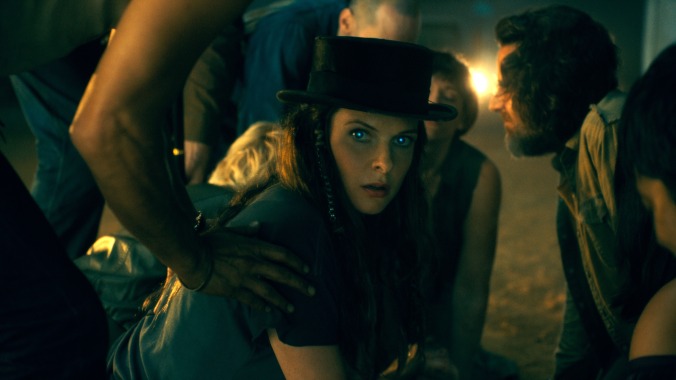There’s a whisper of a poignant idea in Doctor Sleep, whose narrative superficially keys into one of King’s most fruitful subjects: that endless danse macabre with the traumas of the past and the hardships of the present. After a prologue set in the close aftermath of The Shining, the film leaps ahead in time to reintroduce one Danny Torrance (Ewan McGregor), now bearded, disheveled, and all grown up, several decades after his alcoholically and supernaturally driven father tried to kill the family with an axe. Thanks to beyond-the-grave visits from Dick Hallorann (Carl Lumbly, taking over for Scatman Crothers), Danny has learned to use his “shining” to mentally imprison the hungry ghosts that followed him out into the world after that single season at The Overlook. But he hasn’t outrun all his demons; like his dead father, he’s acquired a weakness for the sauce, and an accompanying hair-trigger temper.
Danny’s not the only one with a vice. Expanding on The Shining’s literal and figurative take on the horror of substance abuse, Doctor Sleep introduces a cabal of psychic vampires that hunt special kids just like the one he used to be. Led by the seductively malevolent Rose The Hat (Rebecca Ferguson, enjoyably flamboyant in her big-bad role), these nomadic Near Dark predators treat their pint-sized prey like living vape pens; triggering their pain and fear, they suck the shining straight out of them in puffs of vapor, slowing their own aging process. The plot, which spans several years and hundreds of miles, slowly arranges a showdown between the forever-young villains and the powerful teenage telepath, Abra (Kyliegh Curran), who gets on their radar. Will Danny, who kicks the sauce and begins using his powers to comfort the dying patients of a hospice clinic, come to the aid of this adolescent miracle child, the same way the caretaker of The Overlook once took an axe for him?
Given how faithfully he adapted Gerald’s Game a couple of years ago, it’s perhaps surprising how many liberties Flanagan takes with King’s text. (Suffice to say, there is no 9/11 subplot to speak of here.) What he largely preserves, for better or worse, is the general goofiness of the novel. Diverging from the raw, pounding horror of The Shining—the page or the big screen incarnation—Doctor Sleep plays closer to an X-Men movie, pitting the bad shiners against the good ones in long-distance mental skirmishes. Flanagan, who’s staged some tricky mind games before (in his Oculus, for example), has some visual and conceptual fun with King’s supernatural ideas: bodies astral-projecting across the globe, rooms turning sideways to plummet characters into subconscious spaces, etc. But for as much as the story concerns leaping into other people’s heads, Flanagan never quite gets into Danny’s; his tortured grappling with his memories is abstract at best, McGregor’s mostly functional performance failing to offer the necessary window into that process.
Maybe Flanagan is just too preoccupied with the opportunity to do his best Kubrick. In Doctor Sleep, he re-stages key scenes and even shots from The Shining, inserting lookalikes—like Alex Essoe from Starry Eyes, who does a mean Shelley DuVall—into his moving wax museum. It’s fun, in a fan fiction kind of way: a major director playing around in another’s sandbox. But beyond the brief moments meant to look like borrowed footage from an earlier movie, the film never seems to exist in the same stylistic universe as The Shining. It possesses none of Kubrick’s glacial dread and almost inhuman, eye-of-god surveillance. In fact, Doctor Sleep is rarely scary at all, even when it’s ostensibly trying to be—a strange admission, given the nerve-racking wonders Flanagan did with composition and atmosphere in his rather Kingish take on Haunting Of Hill House. At least the orchestra gets a workout, mercilessly shredding strings to prop up strangely perfunctory reunions with The Overlook’s scariest guests.
Speaking of which, where else can the film inevitably go but back up that winding mountain road, to the oversized haunted house at top? It’s when Doctor Sleep finally returns to The Overlook—in a climax that diverges as radically from the blueprint as Kubrick’s did—that everything affecting and shameless about the film seems to collide. There’s an undeniable resonance to seeing Danny walk back through the darkened corridors of his one-time home, confronting a past that looks kind of, sort of, vaguely like Jack Nicholson. At the same time, this ending proves to be as pandering, in its checklist of Pavlovian callbacks (typewriter, axe, bathtub, hedge maze), as the comparable sequence in Ready Player One, which had the advantage of being short and also staged by maybe the greatest blockbuster craftsman ever. The dirty trick of Doctor Sleep is that it’s just another nostalgic franchise extension, turning one character’s therapeutic journey into a convenient excuse to play the hits. Whether audiences will be willing to trudge through a slightly dopey, marginally similar fantasy yarn to reach the entrance of that old hotel is a question for the shiners.

 Keep scrolling for more great stories.
Keep scrolling for more great stories.
